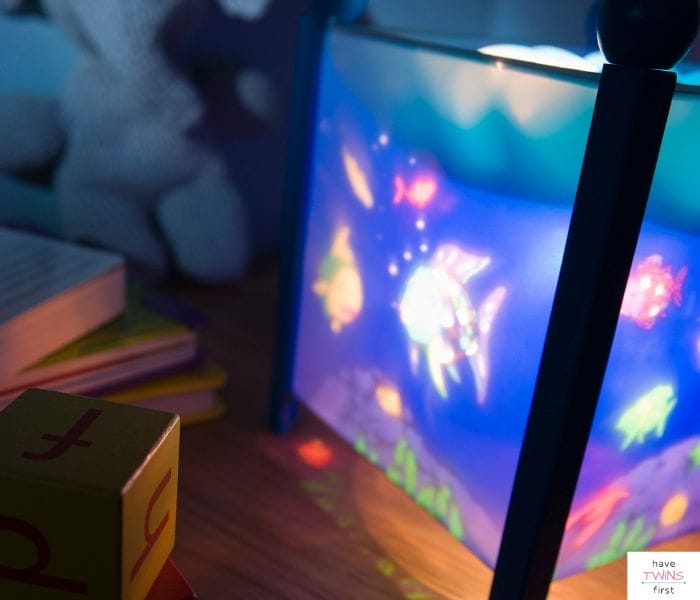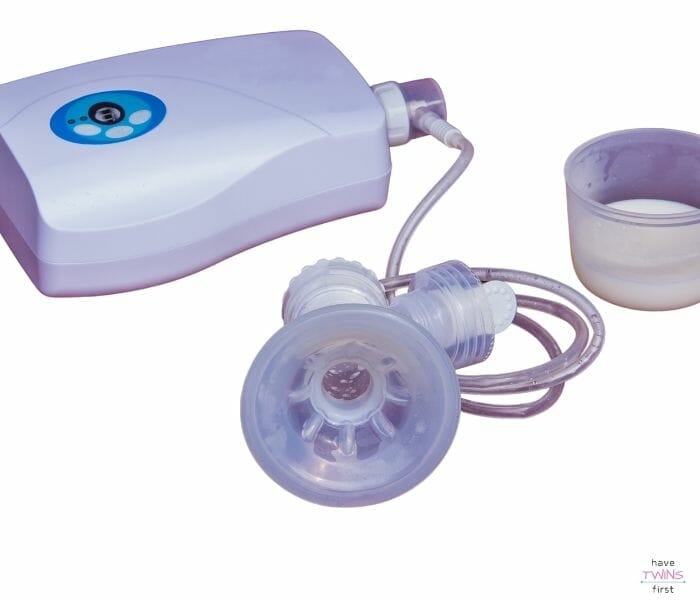After going through a difficult nine months of pregnancy, unfortunately life does not necessarily become easier after your baby is born. You will have new challenges to face after birth.
As a mom of 3, including twins, I know how hard it is when caring for newborns. They require almost around the clock care. That’s why I thought it would be helpful to answer these questions:
- How is long the newborn stage?
- When does the newborn phase end?
Additionally, I will also share what to expect with a newborn at home and tips for surviving this phase of your child’s life.
Please note, there are affiliate links in this post. Read my privacy & disclosure policy at the bottom of this page to learn more.
How Long Is The Newborn Stage?
There is no definitive answer to how long this stage is. Some say that a baby is a newborn for the first 4 weeks after birth, while others say that this stage lasts for 8 weeks.
Sometimes the newborn stage refers to a baby’s neonatal period (first 28 days of a baby’s life). During this period very rapid changes occur. For example, babies establish feeding patterns during this time.
The newborn stage also varies from child to child. Some babies reach their milestones faster while some take some time.
For example, my twins were born at 35 weeks. They took longer than their little brother, who was not born prematurely, to reach specific milestones. This meant their newborn stage was a little longer.
With all that said, if you are looking for a general range for the newborn stage, it can last anywhere from 1 to 3 months.
How Many Weeks Is The Newborn Stage?
Most people count their baby’s age in weeks. Depending on when a newborn reaches its milestones, the newborn stage is generally 4-12 weeks long.
When Does The Newborn Phase End?
The newborn phase ends when your baby reaches the following milestones.
- Regular feeding pattern: Your baby’s feeding schedule becomes more predictable. Most babies require a feed every 2-3 hour at this stage.
- Sleeps longer at night: Baby sleeps in longer chunks of time at night (compared to previously).
- Predictable sleeping schedule: Your baby’s nap times, awake times, and bedtime are more predictable then they used to be.
- Response: Baby smiles or responds to movements. Some babies also make eye contact.
- Better bonding with parents or caretakers: During the first few weeks, babies don’t care who is around them. If your baby starts to show some attention towards the primary caretaker, this is a sign the newborn stage is over.
How Long Until Babies Get Easier In The Newborn Stage?
Once your little one arrives, you can’t expect to have the same peace again as you had before the baby. The reality is parenting problems keep changing, but they are never over.
Caring for a newborn can be one of the hardest stages though, mostly due to lack of sleep. At this stage, babies are very demanding. They require a feed or a diaper change very frequently, and they don’t sleep for long periods of time.
If sleep deprivation is your main concern, then I found at 3 months and then again at 6 months it got easier. This was because a baby’s schedule gets more reliable at this time and babies start to sleep for longer periods of time.
How Long Until Babies Get Less Fussy In The Newborn Stage?
If you are struggling with a fussy newborn, that is very challenging. The intensity of fussiness varies from baby to baby.
Some newborns start to become less fussy in a few weeks, while others take some time. Personally, I found my babies to be the fussiest and colicky around 2 months old. There are several factors that factor into how easy babies seem during the newborn stage.
- Digestive system: If the digestive system is growing healthily, your baby will become less gassy (and less difficult).
- Experience: If the parents have experience in handling a newborn, this stage might be easier because they know what to expect.
- Support: If the parents have a strong support system, this can be a huge help.
- Postpartum recovery: It’s not only about the baby, it’s about the caregiver as well. If mom is in a good mental state and recovering well from birth, caring for a newborn will be easier when compared to parents who are going through postpartum depression or other birth complications.
The factors above all play a role in how hard or easy the newborn stage might be for each family. The answer varies widely from family to family on when it gets easier and babies get less fussy.
With that said, if you want to make things easier more quickly, then it is beneficial to understand what to expect from newborns and how to care for them. The more you learn, the easier it will be.
Do you want the ULTIMATE solution to learning everything you can about newborns?
Check out Newborns Made Easy!

How Long Until The Next Phase After The Newborn Stage?
Babies are newborns from birth to anywhere from 4-12 weeks old. On the other hand, babies are an infant from birth to 1 year old. So, technically, the next stage after the newborn stage is the infant stage. It will last until your baby is around 1 year-old. After that, infants become a toddlers.
During the infant stage in the timeframe of 3-12 months, babies reach a lot of milestones very quickly. Some of these milestones include holding up their head, rolling over, learning to sit, responding, crawling and even standing up. Some babies also learn to take a few steps during this stage.
What To Expect From a Newborn
When you know what to expect, it is much easier to manage the situation. A typical newborn schedule is not very predictable.
Not only is your baby learning about this world, but you will also learn so much about your baby during this phase too. Here are some common behaviors you can expect from a newborn, to help you be prepared.
1 – Irregular Sleep
A newborn’s sleep pattern is not predictable. Newborn babies sleep many times throughout the day and may wake up at any time.
Newborns often stay awake for more time at night, but will sleep during the day. Basically, a newborn’s internal biological clocks take some time to mature.
2 – Irregular Feedings
Similar to the sleep schedule, a newborn’s feeding schedule is not predictable. Newborns typically eat every 1.5-2 hours, and to make it more difficult, the time between feeds begins at the start of a feeding.
Feedings take a long time for newborns, anywhere from 20-45 minutes. That means you are going to spend A LOT of time nursing or bottle feeding your little one.
The feeding schedule depends upon the type of milk your baby is drinking too. If a baby is exclusively breastfed, he will become hungry more frequently, compared to a baby who is formula fed. Moreover, during the “growth spurt” phase of a newborn, they eat even more often than normal (more on that below).
3 – Cluster Feeding
Your newborn may suddenly want to eat a lot. He may want a greater number of short feedings during a short time span. This is normal behavior for a newborn and it is often called cluster feeding.
Cluster feeding usually happens when a baby is two to three weeks old and five to six weeks old. It might happen again around three months and six months too.
Babies tend to cluster feed during the late afternoon or evening hours. However, the need could happen at any time. Cluster feeding is tough for mothers as breastfeeding is hard work. Make sure to eat well during this time.
4 – Sleeping While “Eating”
This is one of the most common problems many new mothers face, but no one specifically tells them to expect it. Your baby may sleep while the nipple is in the mouth.
You may think that your baby is feeding, but he is actually not, he is just sleeping. When you think your baby is full, he will wake up and want to feed.
A solution to this problem is to look at your baby’s under chin. If there is gulping movement, it means the baby is drinking milk. But, if only the chin is moving, most likely your baby is asleep.
5 – Long Total Sleep Hours
Newborns tend to sleep 16 to 17 hours a day. Some babies even sleep for up to 19 hours. However, they will wake up frequently for feedings and diaper changes.
Newborns have short sleep cycles, usually around 45 to 60 minutes. Moreover, their stomachs are tiny so they will become hungry more often. That is why they wake up frequently, but the total sleeping hours is more than you would think.
6 – Colic
Colic is a common and challenging issue for new parents. It is a term used to describe frequent, intense, prolonged, and unexplained crying in babies. However, not all babies get colic.
Colic could begin in the first few days of your baby’s birth. It often peaks at around 6 weeks old, and goes away by the time a baby is about 3-4 months old.
If your baby cries for a long time for no apparent reason, it is likely colic. Luckily is colic is harmless, it’s just a very frustrating time for parents.
7 – Frequent Diaper Changes
Newborns have tiny bladders and immature digestive systems. You can expect a newborn’s diaper to be wet every 1-2 hours.
Newborn size diapers are very small and a newborn’s skin is very sensitive. This means it is very easy to develop diaper rash. That is why it is essential to change diapers frequently. You can expect to change 8 to 12 diapers per day.
8 – Crying
The only way newborns can communicate with their parents is by crying. They will cry for everything, including (but not limited to):
- hunger
- sleepy
- dirty diaper
- gas, digestive issues, or colic
- overstimulation, illness, or discomfort
Needless to say, you can expect a lot of crying during the early days.
9 – Limited Motor Skills
Newborns have very limited motor skills, after all they cannot support their own head yet. Most of their movements are reflexes such as startle reflex, kicking, gripping objects in their palms, and turning their head when their cheek is touched.
10 – Spitting Out Milk / Spitting Up
Your newborn might spit out milk often, even without burping. They have very immature digestive systems. Be prepared for a lot of milk clean up.
How To Survive The Newborn Stage
You will likely receive many tips and bits of advice for surviving the newborn stage, both solicited and unsolicited. Some will be helpful, and some will not be. Here are my practical, yet helpful tips, for surviving the newborn stage.
1 – Set Realistic Expectations
These days are going to be very hard, but they will be less stressful if you keep your expectations realistic. Learning about newborn care and being realistic will reduce your stress.
Be ready for sleepless nights, irregular daily schedules, fussiness, and feeling overwhelmed. The more ready you are, the easier your transition will be.
2 – Learn To Swaddle
Swaddling is a very common and traditional practice of wrapping the baby in a breathable fabric. Here are some of its many benefits.
- womb-like feeling for babies
- calming
- reduces crying spells
- regulates temperature (if you choose the right fabric)
- reduces SIDS
- promotes healthy sleep
The Happiest Baby On The Block by Dr. Karp, does a great job explaining why swaddling is so important and how to help your newborn sleep longer (I highly recommend checking it out). If you find traditional swaddles difficult, you can get good Velcro swaddles that make it super easy to wrap your newborn to keep them comfortable.
3 – Learn Baby’s Language
Learning a newborn’s language can be very beneficial. When you understand what your baby needs, it will be much easier to take care of them. Here are the common baby crying sounds that indicate different baby needs.
- Owh – sleepiness
- Neh – hunger
- Heh – discomfort (hot, cold, or wet)
- Eh – upper wind (burp)
- Eairh – lower wind (gas)
4 – Follow a Routine
It will not be possible for you to follow a schedule with a newborn. But you can follow a specific routine. A schedule is the timing of activities, while a routine is the pattern of activities.
Follow the same daily routine, especially the nighttime routine. Consider keeping a baby log. You can track the activities and set a routine that suits you the best.
>>Check out these First Year Baby Schedules (Newborn to 12 Months) to understand how to set a good routine<<
5 – Keep Your Baby Comfortable
Make sure you keep your baby’s diaper dry. Get a brand that has a wetness indicator and change your baby’s diaper when its dirty. I personally prefer Pampers Swaddlers diapers for newborns, and if you find yourself dealing with diaper rash, Aquaphor is awesome for treating it.
6 – Have Baby Essentials Handy
Keeping baby essentials handy will ensure you have all the equipment you need to care for a newborn. Grab my FREE printable baby registry checklist, to make sure you get everything you need.
Once you know what you need, you can assemble a diaper caddy to have everything ready to use and close by, especially the feeding and diaper changing items.
7 – Practice Safe Co-Sleeping
You can practice safe co-sleeping, by choosing to get a bedside bassinet for your baby. Nighttime feedings and diaper changes will be a lot easier, while your newborn has a safe space to sleep.
8 – Use Skin-To-Skin Contact
Skin-to-skin contact is a well-known method of providing comfort to both newborns and parents. It will also improve bonding with your child. Not only will your baby will reap the benefits, but skin-to-skin contact can go a long way in reducing stress for parents too.
9 – Ask Pediatrician About Colic Drops
While visiting the pediatrician, don’t forget to ask about their advice on using colic drops or gripe water. These items are best for providing relief from gas and digestive issues.
Some colic drops include soothing herb extracts, such as chamomile, that will soothe the baby. If your colicky baby stays comfortable after use, you stress will be greatly reduced.
10 – Use a Baby Monitor
Baby monitors can be very helpful when you have young kids at home. You can monitor your baby while he sleeps and you are busy in a separate room.
No need to run to the baby’s room every few minutes to check if your little one is sleeping peacefully. Moreover, it will give you a piece of mind.
11 – Install Blackout Curtains or Shades
Blackout shades or blackout curtains in the nursery can improve your baby’s sleep during the daytime and help your baby sleep later into the morning. I recommend investing in some blackout curtains or shades if the baby’s room is bright during the day.
It will provide your baby with a soothing sleep environment, and he will be less cranky and fussy after a good, peaceful sleep.
12 – Use White Noise
Do not underestimate the power of white noise. These sounds give the baby a womb-like feeling because they have been listening to such sounds in the womb. Playing a white noise machine at night or when your baby is upset may help him soothe much faster.
13 – Eat Well & Stay Hydrated
It’s usually hard for parents of newborns to prepare meals at home. Try to avoid eating too much junk food, just because it’s convenient. It doesn’t provide enough nutrition and energy, which will eventually increase stress.
Try to eat healthy snacks by stocking up on seasonal fruits, vegetables (that can be eaten raw), nuts, yogurt, and dried fruits. Prepare freezer meals before your baby arrives and have recipes available that can be prepared in 30 minutes or less.
It’s also important to drink lots of water. Keep a water bottle handy throughout the day, that you can sip on consistently.
14 – Accept Help
Don’t hesitate to accept help. If you have parents, siblings, cousins, friends, or in-laws that are offering help – take it. It will allow you to get some rest. A little break can make a big difference in getting through the newborn stage.
15 – Communicate Well With Your Partner
The first few months of being a parent are hard. It’s not about the baby only. Many couples fail to maintain their relationship strength. This was one of the most trying times in my relationship for sure.
Parents hardly get time for themselves, meaning they also don’t get time with each other. On top of that, a shortage of money or more domestic chores adds stress.
At this stage, good communication is extremely important. Talk with your partner about the things causing you stress, have some family time, and stay positive as much as possible.
16 – Ignore People’s Comments
A very unexpected, but annoying problem, new parents face is comments from others. It could be about your baby’s appearance, your parenting style, your own appearance, unsolicited pieces of advice, and much more.
You can’t shut everyone’s mouth, but you can choose to ignore the comments as much as possible. Don’t try to answer everyone. If you feel annoyed, just smile, ignore, and change the topic.
17 – Seek Professional Support
If you think you are going through postpartum depression, you must seek professional support. Being mentally healthy is a very important part of parenting.
Taking care of a newborn is already so hard, and if you are also going through depression it will be a lot harder for you. Make sure you get the help you need and visit your doctor as soon as possible.
Now that you know how long the newborn phase is, it might actually go by more quickly than you realize!
The newborn stage is very short, it lasts ends anywhere from 4-12 weeks old. While your baby is very new to this world, he will learn a lot of things very quickly. Not only do babies learn a lot, but parents will also learn so much about their babies too during this stage.
Once the newborn stage ends, babies have a more predictable sleeping and eating schedule. You will be able to better manage your baby and the house together. Make sure you understand what to expect and learn how to care for a newborn to make your life as easy as possible during this time. Good luck!






